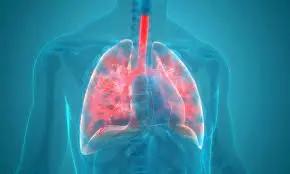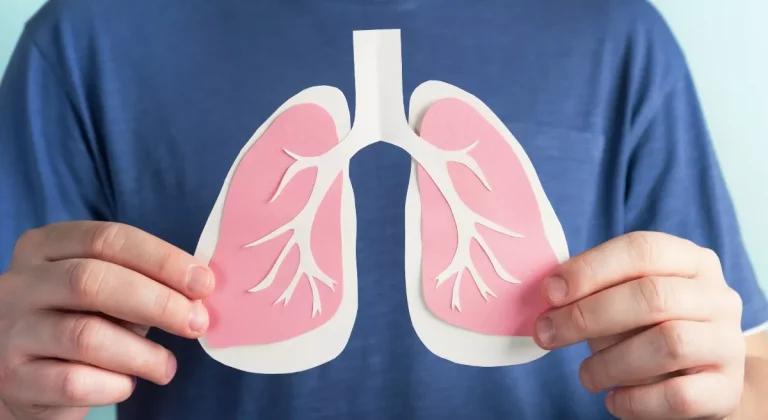More people get pneumonia during the winter. It is often easily treatable at-home with over the counter treatments, but in certain situations a delay in seeking medical help can be life-threatening. How do you protect yourself against pneumonia and is it contagious?
Pneumonia is contagious when viruses or bacteria are responsible for the infection. However, fungal pneumonia and aspiration pneumonia are not passed on from person to person. Lets take a deep look into how contagious pneumonia is.
📝 What is pneumonia?
Pneumonia is a lung infection that affects the tiny air sacs (alveoli) in your lungs. When you have pneumonia, these air sacs get inflamed and fill with fluid making it harder to breathe.
🦠 What causes pneumonia?
Viruses like the influenza flu or RSV (respiratory syncytial virus) cause most cases of pneumonia. Symptoms develop over time and tend to be mild.
Less often, bacteria can cause pneumonia. People usually will become sick more quickly, starting with a sudden high fever, cough, and sometimes fast breathing.
Types of pneumonia
- Bacterial pneumonia
The most common cause of pneumonia is a bacteria called pneumococcal pneumonia (streptococcus pneumoniae). Some types of bacteria can cause atypical pneumonia, such as mycoplasma pneumonia (walking pneumonia).
- Viral pneumonia
The most common causes of viral pneumonia are the influenza (flu) and rhinovirus (common cold). One out of three pneumonia cases are viral. RSV is most often the cause of viral pneumonia in children.
- Fungal pneumonia
Inhaling fungi found in soil or animal droppings can cause this rare form of pneumonia. It’s rare in the UK and more likely to affect people with a weakened immune system.
- Aspiration pneumonia
An infection can happen when food or liquids are accidentally inhaled into the lungs. It’s most common in people who already have a condition affecting their brain or their ability to swallow.
📝 Is pneumonia contagious?
Yes, some types of pneumonia are contagious, meaning it spreads from person to person. Bacterial pneumonia and viral pneumonia are mostly spread by close contact, when people infected cough, sneeze or talk, sending respiratory droplets into the air. It can also be caught by touching an object or surface that has the germs on it and then touching your nose or mouth.
Generally, if you have bacterial pneumonia, you are contagious for around 48 hours after starting antibiotics and your fever has gone away. If it is viral pneumonia, as symptoms start to go away (especially fever) so does the contagious period. Fungal pneumonia and aspiration pneumonia are not contagious.
📊 Symptoms of pneumonia
Common symptoms of pneumonia include:
- Cough. People with viral pneumonia often have a dry cough without sputum (you may have a cough with sputum)
- A high fever
- Difficulty breathing and shortness of breath
- Chest pain
- Loss of appetite
- Muscle aches and pains
Symptoms can range from mild to severe. Babies, young children and older adults may have different symptoms.
🧑 Who’s most at risk of pneumonia?
People with increased risk factors of developing pneumonia are:
- Babies and very young children
- Elderly people
- Smokers
- People with other health conditions, such heart disease, COPD (chronic obstructive pulmonary disease) and other lung diseases
- People with a weakened immune system such as HIV/AIDS or alcoholism, or have undergone an organ transplant
If you’re in one of these high risk groups you should take extra care to reduce your chances of catching pneumonia.
🩺 Diagnosis of pneumonia
A healthcare provider will normally carry out a physical examination, discuss symptoms, listen to your breathing, measure blood pressure, pulse rate and temperature and the amount of oxygen in your blood. Based on these findings your healthcare provider will decide whether you should go to the hospital or if you can be treated at home.
Other tests may be requested:
- Chest x-ray
- Blood tests
- Phlegm sample for testing
- A urine sample for testing
🏥 Pneumonia treatment
An infected person will be prescribed treatment depending on whether the cause is bacterial, viral or fungal. Treatment options include antibiotics, antivirals, or antifungals. Improvement in symptoms are normally seen within 2 to 4 weeks.
Some people are at higher risk of becoming seriously ill and may need to go to hospital for treatment. Hospital treatment may also involve be given IV fluids, oxygen therapy or fluid drainage to treat the infection.
🔑 Prevention of pneumonia
The pneumococcal vaccine is the best form of prevention against Streptococcus pneumoniae, which is the most common cause of bacterial pneumonia.
The pneumonia vaccination is recommended for babies, older adults aged 65 plus and those with certain long-term medical conditions.
In the UK pneumococcal vaccine is usually given as part of the routine NHS child vaccination schedule.
Final note
Certain types of pneumonia are contagious, but practicing good hygiene is the best way to minimise the chance of catching it. Protect yourself and others from this respiratory infection by:
- Avoiding touching your face
- Sneezing into your elbow
- Regular hand washing
- Wearing a mask in crowded or poorly ventilated areas
The different causes and symptoms of pneumonia can make things confusing. A high fever, bloody or unusually coloured mucus, chest pain and shortness of breath are symptoms you shouldn’t ignore. Always seek medical attention when your body is telling you that something isn’t right.
Sources
- Pneumonia – NHS
- What is pneumonia? Causes, symptoms and risks – Asthma – Lung UK
- What Causes Pneumonia? | American Lung Association
Medical Disclaimer
NowPatient has taken all reasonable steps to ensure that all material is factually accurate, complete, and current. However, the knowledge and experience of a qualified healthcare professional should always be sought after instead of using the information on this page. Before taking any drug, you should always speak to your doctor or another qualified healthcare provider.
The information provided here about medications is subject to change and is not meant to include all uses, precautions, warnings, directions, drug interactions, allergic reactions, or negative effects. The absence of warnings or other information for a particular medication does not imply that the medication or medication combination is appropriate for all patients or for all possible purposes.









